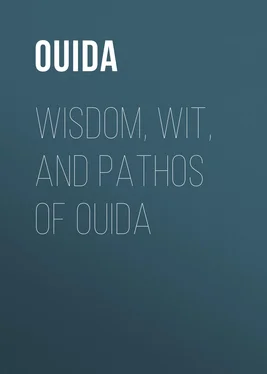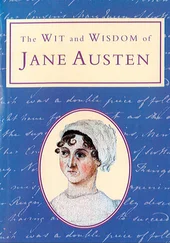Ouida - Wisdom, Wit, and Pathos of Ouida
Здесь есть возможность читать онлайн «Ouida - Wisdom, Wit, and Pathos of Ouida» — ознакомительный отрывок электронной книги совершенно бесплатно, а после прочтения отрывка купить полную версию. В некоторых случаях можно слушать аудио, скачать через торрент в формате fb2 и присутствует краткое содержание. Жанр: foreign_prose, literature_19, foreign_antique, на английском языке. Описание произведения, (предисловие) а так же отзывы посетителей доступны на портале библиотеки ЛибКат.
- Название:Wisdom, Wit, and Pathos of Ouida
- Автор:
- Жанр:
- Год:неизвестен
- ISBN:нет данных
- Рейтинг книги:4 / 5. Голосов: 1
-
Избранное:Добавить в избранное
- Отзывы:
-
Ваша оценка:
- 80
- 1
- 2
- 3
- 4
- 5
Wisdom, Wit, and Pathos of Ouida: краткое содержание, описание и аннотация
Предлагаем к чтению аннотацию, описание, краткое содержание или предисловие (зависит от того, что написал сам автор книги «Wisdom, Wit, and Pathos of Ouida»). Если вы не нашли необходимую информацию о книге — напишите в комментариях, мы постараемся отыскать её.
Wisdom, Wit, and Pathos of Ouida — читать онлайн ознакомительный отрывок
Ниже представлен текст книги, разбитый по страницам. Система сохранения места последней прочитанной страницы, позволяет с удобством читать онлайн бесплатно книгу «Wisdom, Wit, and Pathos of Ouida», без необходимости каждый раз заново искать на чём Вы остановились. Поставьте закладку, и сможете в любой момент перейти на страницу, на которой закончили чтение.
Интервал:
Закладка:
"When all green places have been destroyed in the builder's lust of gain:—when all the lands are but mountains of brick, and piles of wood and iron:—when there is no moisture anywhere; and no rain ever falls:—when the sky is a vault of smoke; and all the rivers reek with poison:—when forest and stream, and moor and meadow, and all the old green wayside beauty are things vanished and forgotten:—when every gentle timid thing of brake and bush, of air and water, has been killed because it robbed them of a berry or a fruit:—when the earth is one vast city, whose young children behold neither the green of the field nor the blue of the sky, and hear no song but the hiss of the steam, and know no music but the roar of the furnace:—when the old sweet silence of the country-side, and the old sweet sounds of waking birds, and the old sweet fall of summer showers, and the grace of a hedgerow bough, and the glow of the purple heather, and the note of the cuckoo and cushat, and the freedom of waste and of woodland, are all things dead, and remembered of no man:—then the world, like the Eastern king, will perish miserably of famine and of drought, with gold in its stiffened hands, and gold in its withered lips, and gold everywhere:—gold that the people can neither eat nor drink, gold that cares nothing for them, but mocks them horribly:—gold for which their fathers sold peace and health, and holiness and liberty:—gold that is one vast grave."
The earth is crowded full with clay gods and false prophets, and fresh legions for ever arriving to carry on the old strife for supremacy; and if a man pass unknown all the time that his voice is audible, and his hand visible, through the sound and smoke of the battle, he will dream in vain of any remembrance when the gates of the grave shall have closed on him and shut him for ever from sight.
When the world was in its youth, it had leisure to treasure its recollections; even to pause and look back, and to see what flower of a fair thought, what fruit of a noble art it might have overlooked or left down-trodden.
But now it is so old, and is so tired; it is purblind and heavy of foot; it does not notice what it destroys; it desires rest, and can find none; nothing can matter greatly to it; its dead are so many that it cannot count them; and being thus worn and dulled with age, and suffocated under the weight of its innumerable memories, it is very slow to be moved, and swift—terribly swift—to forget.
Why should it not be?
It has known the best, it has known the worst, that ever can befall it.
And the prayer that to the heart of a man seems so freshly born from his own desire, what is it on the weary ear of the world, save the same old old cry which it has heard through all the ages, empty as the sound of the wind, and for ever—for ever—unanswered?
There is no more terrible woe upon earth than the woe of the stricken brain, which remembers the days of its strength, the living light of its reason, the sunrise of its proud intelligence, and knows that these have passed away like a tale that is told; like a year that is spent; like an arrow that is shot to the stars, and flies aloft, and falls in a swamp; like a fruit that is too well loved of the sun, and so, over-soon ripe, is dropped from the tree and forgot on the grasses, dead to all joys of the dawn and the noon and the summer, but still alive to the sting of the wasp, to the fret of the aphis, to the burn of the drought, to the theft of the parasite.
She only dimly understood, and yet she was smitten with awe and reverence at that endless grief which had no taint of cowardice upon it, but was pure as the patriot's despair, impersonal as the prophet's agony.
For the first time the intellect in her consciously awoke. For the first time she heard a human mind find voice even in its stupor and its wretchedness to cry aloud, in reproach to its unknown Creator:
"I am yours ! Shall I perish with the body? Why have you ever bade me desire the light and seek it, if for ever you must thrust me into the darkness of negation? Shall I be Nothing?—like the muscle that rots, like the bones that crumble, like the flesh that turns to ashes, and blows in a film on the winds? Shall I die so? I?—the mind of a man, the breath of a god?"
He could not bear to die without leaving behind his life some work the world would cherish.
Call it folly, call it madness, it is both: the ivory Zeus that was to give its sculptor immortality, lives but in tradition; the bronze Athene, that was to guard the Piræus in eternal liberty, has long been levelled with the dust; yet with every age the artist still gives life for fame, still cries, "Let my body perish, but make my soul immortal!"
The spider had drawn his dusty trail across them; the rat had squatted at their feet; the darkness of night had enshrouded and defaced them; yet with the morning they arose, stainless, noble, undefiled.
Amongst them there was one colossal form, on which the sun poured with its full radiance.
This was the form of a captive grinding at a millstone; the majestic, symmetrical, supple form of a man who was also a god.
In his naked limbs there was a supreme power; in his glance there was a divine command; his head was lifted as though no yoke could ever lie on that proud neck; his foot seemed to spurn the earth as though no mortal tie had ever bound him to the sod that human steps bestrode: yet at the corn-mill he laboured, grinding wheat like the patient blinded oxen that toiled beside him.
For it was the great Apollo in Pheræ.
The hand which awoke the music of the spheres had been blood-stained with murder; the beauty which had the light and lustre of the sun had been darkened with passion and with crime; the will which no other on earth or in heaven could withstand had been bent under the chastisement of Zeus.
He whose glance had made the black and barren slopes of Delos to laugh with fruitfulness and gladness—he whose prophetic sight beheld all things past, present, and to come, the fate of all unborn races, the doom of all unspent ages—he, the Far-Striking King, laboured here beneath the curse of crime, greatest of all the gods, and yet a slave.
In all the hills and vales of Greece his Io pæan sounded still.
Upon his holy mountains there still arose the smoke of fires of sacrifice.
With dance and song the Delian maidens still hailed the divinity of Lêtô's son.
The waves of the pure Ionian air still rang for ever with the name of Delphinios.
At Pytho and at Clarus, in Lycia and in Phokis, his oracles still breathed forth upon their fiat terror or hope into the lives of men; and still in all the virgin forests of the world the wild beasts honoured him wheresoever they wandered, and the lion and the boar came at his bidding from the deserts to bend their free necks and their wills of fire meekly to bear his yoke in Thessaly.
Yet he laboured here at the corn-mill of Admetus; and watching him at his bondage there stood the slender, slight, wing-footed Hermes, with a slow, mocking smile upon his knavish lips, and a jeering scorn in his keen eyes, even as though he cried:
"O brother, who would be greater than I! For what hast thou bartered to me the golden rod of thy wealth and thy dominion over the flocks and the herds? For seven chords strung on a shell—for a melody not even thine own! For a lyre outshone by my syrinx hast thou sold all thine empire to me. Will human ears give heed to thy song now thy sceptre has passed to my hands? Immortal music only is left thee, and the vision foreseeing the future. O god! O hero! O fool! what shall these profit thee now?"
Thus to the artist by whom they had been begotten the dim white shapes of the deities spoke. Thus he saw them, thus he heard, whilst the pale and watery sunlight lit up the form of the toiler in Pheræ.
Читать дальшеИнтервал:
Закладка:
Похожие книги на «Wisdom, Wit, and Pathos of Ouida»
Представляем Вашему вниманию похожие книги на «Wisdom, Wit, and Pathos of Ouida» списком для выбора. Мы отобрали схожую по названию и смыслу литературу в надежде предоставить читателям больше вариантов отыскать новые, интересные, ещё непрочитанные произведения.
Обсуждение, отзывы о книге «Wisdom, Wit, and Pathos of Ouida» и просто собственные мнения читателей. Оставьте ваши комментарии, напишите, что Вы думаете о произведении, его смысле или главных героях. Укажите что конкретно понравилось, а что нет, и почему Вы так считаете.












